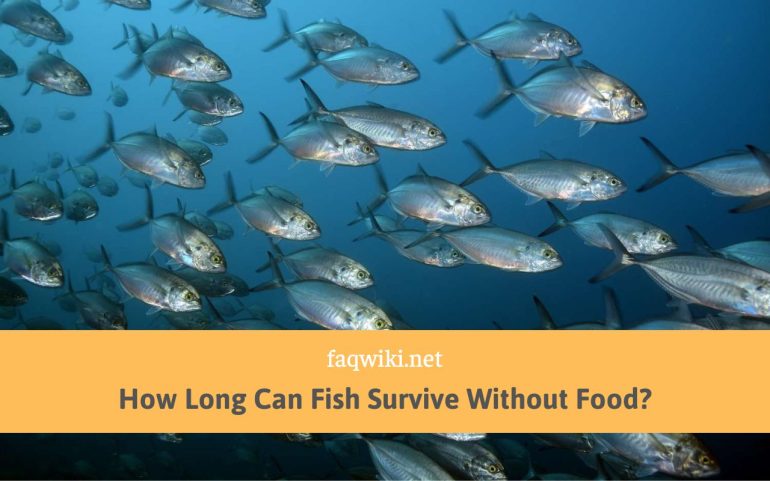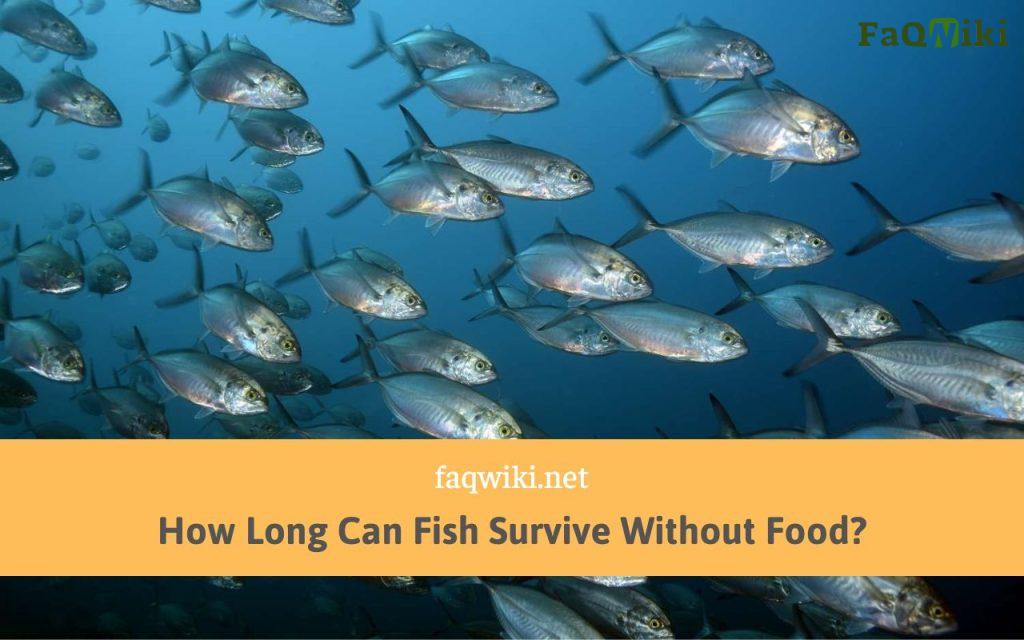How Long Can Fish Survive Without Food?

How Long Can Fish Survive Without Food? For the maintenance of optimal health and vitality, fish rely on receiving proper nutrition. However, sometimes fish owners may forget to feed their fish, or circumstances may prevent them from doing so. It’s natural to wonder how long fish can survive without food. In this article, we’ll explore the factors that determine how long a fish can go without food, signs that a fish is starving, and strategies to prevent starvation in fish.

Metabolic Rate and Feeding Frequency of Fish
A fish’s metabolic rate is the rate at which it burns energy to maintain its bodily functions. The metabolic rate of fish varies depending on the species, size, and activity level of the fish. Generally, the metabolic rate of fish is higher during periods of activity and feeding. Thus, fish that are fed more frequently tend to have higher metabolic rates than those that are fed less frequently.
Different species of fish have different feeding frequencies. Some fish require daily feedings, while others can go without food for several days. For example, Betta fish are known for their ability to survive for several days without food, while Goldfish should be fed at least once a day. It’s important to research the specific dietary needs of the fish you keep to ensure that you’re feeding them the right amount and frequency.
Energy Reserves and Starvation
Fish store energy reserves in their bodies in the form of fat and glycogen. These energy reserves are used to fuel the fish’s bodily functions and activities, including swimming, breathing, and digesting food. The amount of energy reserves a fish has depends on several factors, including its species, size, and diet.
When a fish goes without food, it begins to use its energy reserves to maintain its bodily functions. Over time, the fish’s energy reserves become depleted, and it becomes weaker and more vulnerable to disease and stress. Prolonged hunger can be deadly, resulting in fatal organ failure.
Environmental Factors that Affect Fish Feeding Behavior
Several environmental factors can affect a fish’s feeding behavior, including temperature, water quality, and lighting. Fish are more likely to feed when the water temperature is within their preferred range. Poor water quality can also discourage fish from feeding. Inadequate lighting can also affect a fish’s feeding behavior, as some species require specific lighting conditions to see their food.
Fish that are kept in captivity may exhibit different feeding behaviors than those in the wild. In the wild, fish have to hunt for their food, whereas captive fish have their food provided to them. Thus, captive fish may become more dependent on their owners for food and may have different feeding patterns than their wild counterparts.
Signs That a Fish Is Starving
A fish that is starving may exhibit several behavioral and physical changes. For example, it may become lethargic and spend more time resting at the bottom of the tank. Its fins may become clamped, and it may lose its appetite entirely. In severe cases, the fish may become emaciated and develop sunken eyes and a hollow belly.
Underfeeding or overfeeding fish can have negative health consequences. Underfed fish may become malnourished, making them more susceptible to disease and stress. Overfed fish may become obese, leading to a host of health problems, including swim bladder disease and heart failure.
How Long Can Different Species of Fish Go Without Food?
The length of time a fish can go without food varies depending on several factors, including its species, size, and overall health. Betta fish can survive for up to two weeks without food, while Goldfish should not go more than two to three days without food. Catfish and Koi fish can survive for several weeks without food, while larger predatory fish such as pike and bass can only survive for a few days without food.
It’s important to note that these estimates are based on the assumption that the fish is in good health and has sufficient energy reserves. If a fish is already weakened due to illness or poor water quality, it may not be able to survive as long without food.
Strategies to Prevent Starvation in Fish
The best way to prevent starvation in fish is to establish a consistent feeding schedule that meets the nutritional needs of the fish. This involves researching the specific dietary requirements of the fish you keep and feeding them the appropriate amount and frequency.
It’s also important to monitor the behavior and appearance of your fish regularly to ensure that they’re healthy and well-fed. If you notice any signs of starvation or malnourishment, adjust your feeding schedule accordingly. However, it’s important not to overfeed your fish, as this can also have negative health consequences.
In addition to establishing a regular feeding schedule, you can also provide your fish with natural sources of food, such as live or frozen food. This can provide additional nutrients and help stimulate the fish’s natural feeding behavior.
Conclusion
In conclusion, the length of time a fish can survive without food varies depending on several factors, including its species, size, and overall health. It’s important to establish a consistent feeding schedule that meets the nutritional needs of your fish and to monitor their behavior and appearance regularly to ensure they’re healthy and well-fed. Providing natural sources of food can also be beneficial for your fish’s health and well-being.
Read more useful articles here!
FAQs
Can fish survive without food for a month?
Some species of fish, such as catfish and Koi, can survive for several weeks without food. However, it’s not recommended to leave your fish without food for such a long period, as it can have negative health consequences.
How often should I feed my fish?
The feeding frequency of fish varies depending on the species. Some fish require daily feedings, while others can go without food for several days. Research the specific dietary requirements of the fish you keep to ensure you’re feeding them the appropriate amount and frequency.
Can overfeeding fish be harmful?
Yes, overfeeding fish can lead to obesity and a host of health problems, including swim bladder disease and heart failure. It’s important to establish a consistent feeding schedule that meets the nutritional needs of your fish and to monitor their behavior and appearance regularly to ensure they’re healthy and well-fed.
Can poor water quality affect a fish’s feeding behavior?
Yes, poor water quality can discourage fish from feeding. It’s important to maintain clean and healthy water conditions in your fish tank to ensure the health and well-being of your fish.
